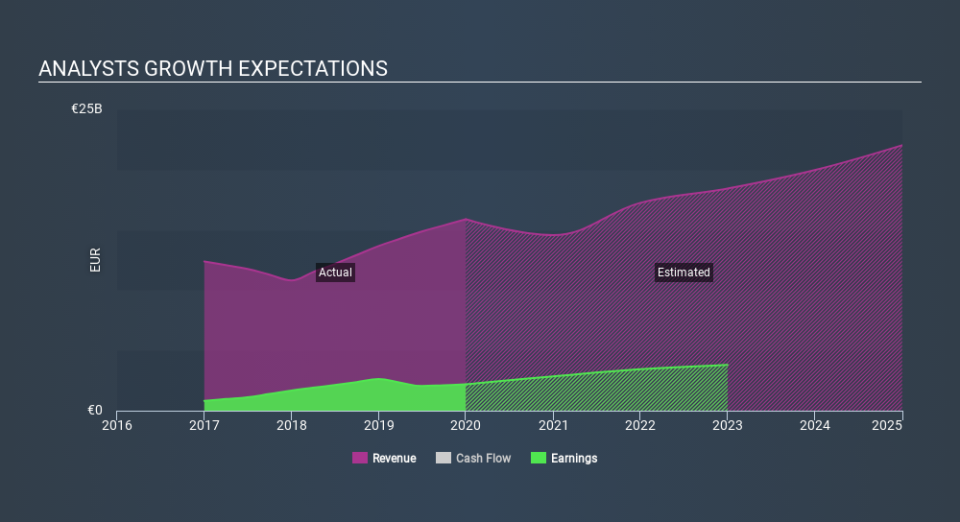Kering SA (EPA:KER) Analysts Are Way More Bearish Than They Used To Be

The latest analyst coverage could presage a bad day for Kering SA (EPA:KER), with the analysts making across-the-board cuts to their statutory estimates that might leave shareholders a little shell-shocked. Revenue and earnings per share (EPS) forecasts were both revised downwards, with the analysts seeing grey clouds on the horizon. Investors however, have been notably more optimistic about Kering recently, with the stock price up a notable 19% to €482 in the past week. Whether the downgrade will have a negative impact on demand for shares is yet to be seen.
Following the latest downgrade, the 22 analysts covering Kering provided consensus estimates of €15b revenue in 2020, which would reflect a chunky 8.3% decline on its sales over the past 12 months. Statutory earnings per share are presumed to jump 33% to €23.13. Before this latest update, the analysts had been forecasting revenues of €17b and earnings per share (EPS) of €25.85 in 2020. It looks like analyst sentiment has declined substantially, with a measurable cut to revenue estimates and a considerable drop in earnings per share numbers as well.
Check out our latest analysis for Kering
The consensus price target fell 6.8% to €558, with the weaker earnings outlook clearly leading analyst valuation estimates. It could also be instructive to look at the range of analyst estimates, to evaluate how different the outlier opinions are from the mean. The most optimistic Kering analyst has a price target of €705 per share, while the most pessimistic values it at €398. These price targets show that analysts do have some differing views on the business, but the estimates do not vary enough to suggest to us that some are betting on wild success or utter failure.
Another way we can view these estimates is in the context of the bigger picture, such as how the forecasts stack up against past performance, and whether forecasts are more or less bullish relative to other companies in the industry. We would highlight that sales are expected to reverse, with the forecast 8.3% revenue decline a notable change from historical growth of 7.2% over the last five years. By contrast, our data suggests that other companies (with analyst coverage) in the same industry are forecast to see their revenue grow 6.0% annually for the foreseeable future. It's pretty clear that Kering's revenues are expected to perform substantially worse than the wider industry.
The Bottom Line
The biggest issue in the new estimates is that analysts have reduced their earnings per share estimates, suggesting business headwinds lay ahead for Kering. Regrettably, they also downgraded their revenue estimates, and the latest forecasts imply the business will grow sales slower than the wider market. After such a stark change in sentiment from analysts, we'd understand if readers now felt a bit wary of Kering.
A high debt burden combined with a downgrade of this magnitude always gives us some reason for concern, especially if these forecasts are just the first sign of a business downturn. See why we're concerned about Kering's balance sheet by visiting our risks dashboard for free on our platform here.
You can also see our analysis of Kering's Board and CEO remuneration and experience, and whether company insiders have been buying stock.
If you spot an error that warrants correction, please contact the editor at editorial-team@simplywallst.com. This article by Simply Wall St is general in nature. It does not constitute a recommendation to buy or sell any stock, and does not take account of your objectives, or your financial situation. Simply Wall St has no position in the stocks mentioned.
We aim to bring you long-term focused research analysis driven by fundamental data. Note that our analysis may not factor in the latest price-sensitive company announcements or qualitative material. Thank you for reading.

 Yahoo Finance
Yahoo Finance 
